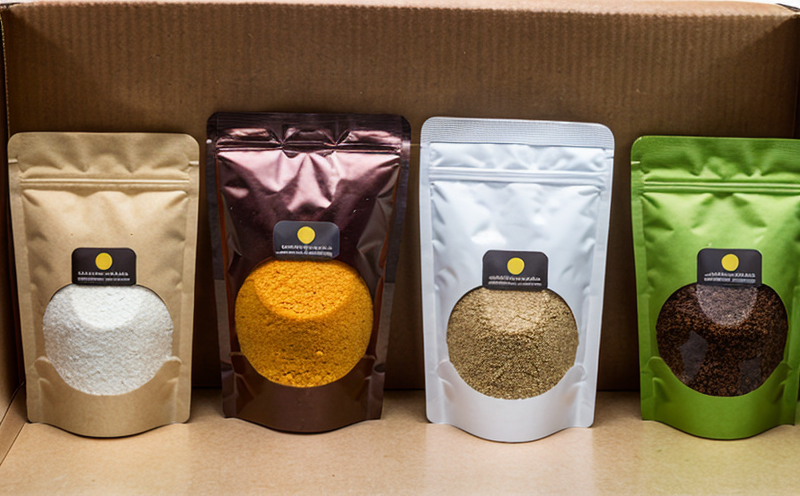Nitrosamines Testing in Rubber Food Contact Materials
The presence of nitrosamines in rubber food contact materials (FCMs) is a critical concern due to their potential carcinogenic and mutagenic properties. These compounds can migrate from the packaging or containers into the food, thereby posing significant health risks to consumers.
Testing for nitrosamines involves several steps, including sample preparation, extraction of the compound, and detection using advanced analytical techniques such as high-performance liquid chromatography (HPLC) coupled with tandem mass spectrometry (MS/MS). The primary focus is on identifying specific nitrosamine compounds like N-nitroso-diethylamine (NDEA), N-nitroso-dimethylamine (NDMA), and others, which are known to be present in rubber materials used in food packaging.
The testing process begins with the selection of appropriate rubber FCMs for analysis. These materials can include natural or synthetic rubbers, compounded with various plasticizers and antioxidants. Once selected, these samples undergo rigorous extraction procedures using solvents such as acetonitrile or methanol, followed by purification steps to remove interfering compounds.
After extraction, the sample is analyzed for nitrosamine content using HPLC-MS/MS. This technique allows for high sensitivity and selectivity in detecting even trace amounts of these harmful substances. The method typically involves derivatization reactions that enhance the ionization efficiency of nitrosamines during MS analysis.
The detection limits for nitrosamines vary depending on the specific compound and the analytical method used, but modern techniques can detect levels as low as parts per billion (ppb). This level of sensitivity is crucial given the potential health risks associated with even small amounts of these compounds in food products.
Understanding the migration behavior of nitrosamines from rubber FCMs into food is essential for ensuring compliance with international standards such as EU Regulation EC 10/2011, which sets limits on the use of specific chemicals in packaging materials that come into contact with food. Compliance with these regulations not only ensures consumer safety but also protects brands from potential legal issues and reputational damage.
For rubber FCMs, the focus is on preventing migration through proper formulation and processing techniques. This includes selecting appropriate raw materials, optimizing curing processes, and using additives that minimize the risk of nitrosamine formation or migration. Regular testing helps manufacturers maintain compliance with regulatory requirements and ensures product safety.
- Sample Preparation: Careful selection and preparation of rubber samples to ensure accurate extraction of nitrosamines.
- Extraction Methods: Use of appropriate solvents and conditions to effectively extract nitrosamines from the sample matrix.
- Detection: Utilization of HPLC-MS/MS for precise quantification of nitrosamine compounds.
The importance of this testing cannot be overstated. It is a key component in ensuring that rubber FCMs meet stringent safety standards and do not pose any risk to consumers. By adhering to these rigorous testing protocols, manufacturers can protect their brands from potential recalls or legal actions while also contributing to public health.
Eurolab Advantages
At Eurolab, we bring a wealth of experience and expertise in the testing of rubber FCMs. Our team of highly skilled scientists and engineers is dedicated to providing accurate, reliable, and timely results. With state-of-the-art laboratories equipped with the latest analytical instruments, we ensure that our clients receive the highest quality service.
We offer a range of services tailored to meet the specific needs of our clients in the consumer products sector. Our comprehensive approach includes not only testing but also providing valuable insights and recommendations for improving product safety and compliance. This proactive stance helps our clients stay ahead of regulatory changes and market trends.
Our commitment to excellence is reflected in our ISO/IEC 17025 accreditation, which ensures that all our testing processes are conducted according to the highest international standards. This accreditation also guarantees that our results are accepted by regulatory bodies worldwide, providing a competitive edge for our clients.
We pride ourselves on delivering personalized service and support throughout the testing process. From initial consultation to final report delivery, we work closely with our clients to understand their specific requirements and ensure that they receive the most relevant and actionable insights.
Customer Impact and Satisfaction
The rigorous testing provided by Eurolab has a direct impact on enhancing customer satisfaction. By ensuring that rubber FCMs are safe for use in food contact applications, we help our clients avoid costly recalls and legal issues. Our services not only meet but often exceed regulatory requirements, providing peace of mind to both manufacturers and consumers.
- Reduced Risk: By eliminating the risk of nitrosamine contamination, we protect brands from potential health risks and associated reputational damage.
- Compliance Assurance: Our testing ensures that rubber FCMs comply with international standards such as EU Regulation EC 10/2011, reducing the likelihood of non-compliance penalties.
- Informed Decision-Making: The detailed reports we provide offer clients valuable insights into the safety and compliance status of their products. This information is crucial for making informed decisions about product development and quality assurance.
Competitive Advantage and Market Impact
In a highly competitive market, ensuring product safety and compliance can be a significant differentiator. Eurolab's expertise in nitrosamines testing provides clients with a clear competitive advantage by helping them meet or exceed regulatory standards. This not only enhances brand reputation but also opens up new markets where stringent safety regulations are enforced.
By offering proactive support to R&D teams, we help our clients stay ahead of emerging trends and regulatory changes. This foresight enables them to develop products that are not only safe but also innovative and market-ready. In an era where consumer trust is increasingly important, such services can be a key factor in driving business growth and success.





